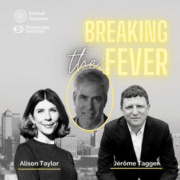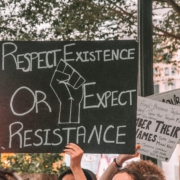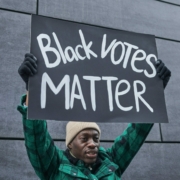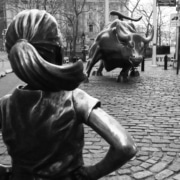The Need for Socially Distanced Citizens

Google the phrase “what democracy looks like.” You’ll get thousands of images of people gathered in public, expressing a political message. These pictures capture a core feature of democracy. Democratic citizens are not mere subjects of government; they are equal participants. Although voting is a central act of citizenship, democracy doesn’t end at the ballot box. After the votes are counted and laws are passed, citizens get to hold government accountable. Public action on the part of citizens is characteristically democratic.
Yet this cannot be the full picture of democracy. Citizens must be both active and reflective. In my new book, Sustaining Democracy, I argue that these can conflict. Political action exposes citizens to cognitive forces that render them more intensely partisan, less open to criticism, and more conformist. That is, political activism can weaken citizens’ reflective capacities, thus damaging democracy. To preserve those capacities, citizens sometimes need social distance from the political fray. They need occasions for solitude, moments of political reflection that are detached from their political loyalties and rivalries alike.
Once the world is saturated with politics, belief polarization is practically inescapable.
A popular belief among professors, politicians, and pundits is that democracy’s dysfunctions are always due to citizens falling short of their responsibilities. Accordingly, there are regular calls for expanded democratic participation, and thus for college curricula and civic activities that are more overtly tied to the politics of the day. The assumption is that democratic engagement is always a matter of taking a side in current political debates. Our civic duty is thought to consist of keeping an open mind and giving a fair hearing to our opponents, while taking a firm stance of our own.
Indeed, democracy needs citizens who can take a principled stand but also listen across political differences. Yet those capacities can be cultivated only when citizens have occasion to think about politics from a perspective that is not tethered to current debates. If we seek to respectfully hear the other side, we sometimes need to listen to political voices that aren’t on any side, because they are immersed in political questions that are not our own. Democracy often looks like masses in the streets. But it also looks like a citizen sitting alone, grappling with ideas that are removed from the politics of the day.
Belief Polarization and Political Coalitions
Return to the Google results. The images aren’t simply pictures of people engaging in political expression. They depict groups of people expressing the same political message. This, too, is what democracy looks like: citizens acting in concert. Democracy is a team effort. To have an effective voice, one must join a choir.
The collective nature of democracy creates tension between political action and political reflection. This is due to the well-documented cognitive phenomenon known as belief polarization (also called group polarization). As individuals interact mainly with like-minded others, they reliably shift into more extreme beliefs and attitudes. So, while working with our allies, we tend to become more fervent in our beliefs and more intensely partisan. We also grow more inclined to dismiss opponents as irrational, benighted, ignorant, and depraved. Hostility toward the other side escalates, and we come to see more and more of what they do as expressions of their misguided politics. Eventually, those who do not share our politics look untrustworthy and dangerous, even threatening to democracy as such.
As belief polarization accelerates, partisan identities take center stage: Consumer habits, religious identification, parenting styles, aesthetic preferences, and even linguistic conventions become political signals. Partisanship enlarges into a lifestyle—a “mega-identity”—and we come to see ourselves and others as defined by politics. Meanwhile, our social environments become increasingly politically homogeneous. As I have put it elsewhere, politics saturates social space.
When political affiliation becomes our core identity, we grow more invested in the perceived differences between our allies and our foes. However, our more partisan selves are also more conformist. Belief-polarized coalitions thus tend to focus on cohesion within their ranks. This leads them to fixate on detecting poseurs and punishing defectors. Needing strong standard setters to define authentic group membership, belief-polarized coalitions also become more hierarchical.
In short, democratic political action heightens our exposure to belief polarization, which leads us to demonize those who don’t share our partisan identity. We eventually see democracy as possible only among those who are just like ourselves. Yet democracy without political disagreement is no democracy at all!
More bad news follows. Although belief polarization renders us more politically active, it also shrinks coalitions because it leads groups to expel perceived moderates. Thus, belief polarization makes coalitions more activist while also undermining their ability to be democratically effective. Belief polarization backfires, so to speak. It jeopardizes civic relations with our allies, too.
How Belief Polarization Works
It’s important to see how belief polarization works. The account I defend holds that it is the product of identity-group corroboration. Members of like-minded groups shift toward extremity to affirm their group membership to peers. They express fidelity to the group’s ideas in ways that are expected to impress allies.
This explains the fact that although belief polarization is a predictable result of like-minded discussion, face-to-face interaction is not necessary. Belief polarization can be activated by way of highly indirect channels, including charts, songs, apparel, and public signage. Put simply, belief polarization can occur simply when an individual is prompted to feel that a group with which they identify widely shares a view that they espouse. We shift toward extremes when we feel that our peers affirm our shared identity.
Consequently, simply being in the presence of allies can initiate belief polarization and a pressure to conform. Moreover, being in view of political foes can also produce that effect, as such encounters can serve as an occasion to assert one’s group loyalty. Once the world is saturated with politics, belief polarization is practically inescapable.
Subscribe to the Ethical Systems newsletter
Managing Belief Polarization
A good deal of democratic theory proposes modes of political interaction designed to inhibit belief polarization. But there’s a crucial difference between prevention and cure, between avoiding further polarization and reversing the polarization that already exists. The United States and other democracies are heavily belief-polarized—cross-partisan animosity far outstrips the actual political differences among opposed citizens. Although we need to curb belief polarization, we also need remedies.
As belief polarization is a by-product of active democratic citizenship, it cannot be eliminated but only managed. We can manage it by mitigating its most destructive effects. Although escalating fervency and animosity are generally harmful to a democracy, they are both upshots of a deeper feature of belief polarization: the quashing of doctrinal variation among allies.
Belief polarization may spoil relations with our political opponents, but its damage begins at home. It causes coalitions to fixate on in-group and out-group differences, thus leading them to embrace increasingly exacting requirements for authentic allyship. Belief-polarized groups thus become more intellectually homogeneous. The key to mitigating belief polarization is to expand one’s sense of permissible doctrinal variation among one’s allies. Once one acknowledges that significant disagreements can persist among allies, it becomes easier to engage reasonably with one’s opponents.
However, given existing levels of polarization, one cannot accomplish this by directly arguing with others, whether they be opponents or allies. The conditions are already primed to initiate belief polarization. Moreover, the aim is not simply to survey the doctrinal variation that happens to persist but rather to recalibrate one’s sense of the bounds of acceptable variation.
The Need for Distance
The task calls for occasions of social distance. One must remove oneself from the pressures to conform to partisan expectations. Accordingly, one needs to separate from one’s allies and adversaries alike. One needs solitude, distance of the kind that permits one to grapple with political ideas that are not prepackaged in the idiom of contemporary partisanship. One needs to encounter ideas that can provoke thinking instead of partisan reflexes. This enables reflection that demonstrates that the spectrum of democratic opinion is both wider and deeper than what can be slotted into today’s political categories.
By encountering a broader palate of political ideas, citizens can more accurately position their own commitments and rivalries, and thereby more reliably distinguish between the internecine disputes among fellow democratic citizens and unbridgeable gaps between democratic ideals and various forms of antidemocracy. It is in light of that broader picture that one can more successfully navigate the relatively local fissures that divide us today.
I am a political philosophy professor, so it may come as no surprise that I think one way to achieve distance is by reading moral and political thought written in other eras, addressed to unfamiliar audiences, and by grappling with unfamiliar problems. The key is to engage with such works as foreign to our own context, to see them as remote. We need to resist the impulse to pulverize everything into the present political idiom.
This proposal runs contrary to popular pedagogical trends that insist upon relevance to current social issues and the experiences of our students. This kind of relevance has value, of course. But it also involves costs. When everything is addressed to contemporary circumstances, we lose sight of the contingency of our current political landscape. We succumb to the temptation to see our own political moment as eternal. This robs us of opportunities to envision a political future where our present divides are obsolete, not because our opponents have been vanquished but because they have been changed.
Accordingly, my claim is not that distanced reflection must be politically irrelevant, but rather that ideas and arguments that are detached from today’s have a political relevance all their own. In seeing the spectrum of democratic opinion as broader than what contemporary politics recognizes, we may be able to overcome the tendency—increasingly on display on campus and elsewhere—to treat political argument itself as falling wholly on the “active” side of citizenship rather than as serving our “reflective” responsibilities. When political argument is taken as just another partisan act, it becomes mere stance-taking that signals allegiance to our partisan coalitions. It changes no minds, and it doesn’t further anyone’s understanding. However, after engaging with the likes of Aristotle, Mencius, Hobbes, and Jane Addams on their own terms, one is better able to situate current debates, and thus to see their contours and limitations.
To be clear, distanced reflection is not a cure-all. Partisan animosity will persist. But the kind of distance I’m proposing aims to mitigate belief polarization by keeping our political thinking limber. It may not lead us to concede anything at all to our opponents’ views, but it provides a better appreciation of the different ways in which our own ideas can be formulated and criticized. This permits us to turn down the temperature in current disagreements by allowing us to see at least some of our adversaries as capable critics rather than as wholly depraved. It will also encourage stronger and more authentically democratic political alliances, alliances that can accommodate internal disagreements and differences. To put the idea in a nutshell: As belief polarization makes trouble for our political rivalries and alliances alike, the task of managing it ultimately falls to us as individuals.
As I note in Sustaining Democracy, we are accustomed to thinking that reflection is a luxury, an escape from our duties to others. Similarly, we tend to think of civic activities as intrinsically public and observable by others. These are errors. Democracy needs active and reflective citizens, and essential modes of democratic action can undercut our reflective capacities. When we overemphasize the active part of democratic citizenship, we consign ourselves to the politics of the moment, which is also the politics of the hot take, the flame war, the internet mob, and the caricature. Not incidentally, it is also the politics of conformity and intellectual narrowness. In the end, it is democratically unsustainable. Though democracy may be most visible when people take to the streets, crucial acts of citizenship don’t appear in Google’s results, because they can be performed only in socially distanced solitude.
Robert B. Talisse is W. Alton Jones Professor of Philosophy at Vanderbilt University. You can follow him on Twitter @RobertTalisse.
This article was originally published on Heterodox Academy, and is reprinted with permission.









